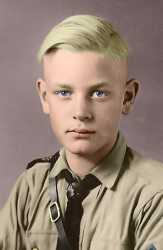>>19633360houston stewart chamberlain, who hitler frequently quotes in mein kampf and who he met in person to discuss chamberlains literary work, states in his book 'FOUNDATIONS OF THE NINETEENTH CENTURY':
'Moreover it has appeared to me remarkable that poets from the extreme north of Germany pretty frequently speak of dark hair as a characteristic feature not only of the nobility but also of the people; thus, for example, in Theodor Storm's story, Hans und Heinz Kirch, those genuine defiant Germanic seamen have both “dark brown hair,“ and of another daring figure, Hasselfritz, the poet says that he has brown eyes and brown hair; those genuine Teutons therefore resemble Achilles with his “brown hair.“ How often, too, in the folksongs do “dark brown eyes“ occur! Burns, too, the Scottish peasant-poet, loves the “nut-brown maidens“ of his home. † Once while on a voyage in Norway north of the 70th degree I was driven out of my course to a group of islands rarely visited by strangers, and to my astonishment I found among the fair fishing population individuals who corresponded exactly to that type: remarkably finely built men with noble, imposing Viking physiognomy, and in addition almost raven-black hair. Later I met this type in the south-east of Europe, in the German colonies of Slavonia, which, settled there for centuries, have kept their German race stainlessly pure amid the Slavs: the figure, the Moltke type (or, as the English say, the Wellington type), and the black hair distinguish these people from their neighbours, who are chiefly fair and have more or less expressionless countenances. However, we do not require to go so far; we find this type almost the predominant one in German Tyrol, whose inhabitants Henke says “represent the true type of the primeval Teuton.“ The same scholar explains their having, for the most part, dark and often black hair [...]'

